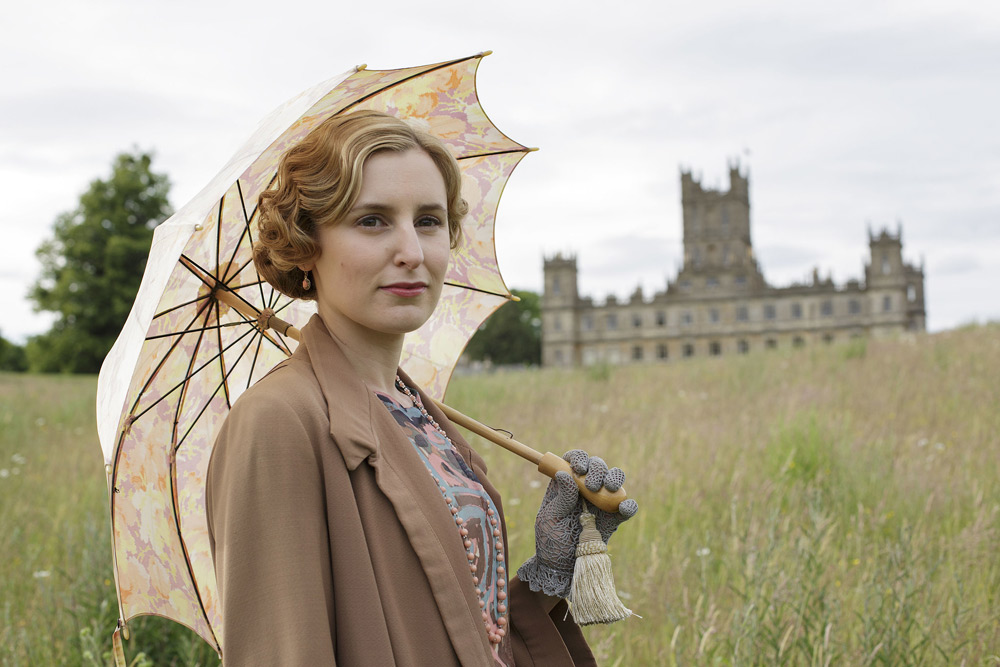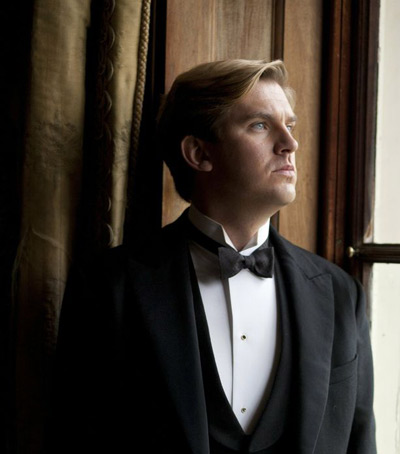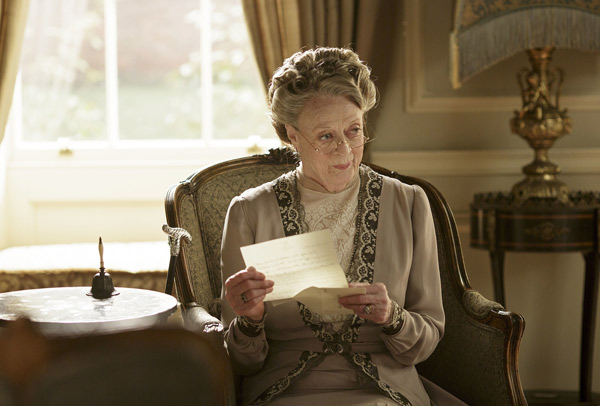 This review contains spoilers for the final episode of Downton Abbey.
This review contains spoilers for the final episode of Downton Abbey.
After six seasons, 52 episodes and innumerable dinner parties, put-downs and plot twists, Britain’s most popular export since afternoon tea is closing up shop. Already concluded in its native country last Christmas, Downton Abbey aired its final PBS outing Sunday night.
Even by the standards of Downton Abbey’s Christmastime extravaganzas, the movie-length episode was epically warm and fuzzy, with happy resolutions piling up like racecars at Brookline. (Too soon?) There was the long-awaited happy wedding of Lady Edith; the redemption of Thomas Barrow; the offstage wedding of Isobel and Lord Merton; the sort-of reconciliation of Edith and Lady Mary; the long-deserved retirement of Carson; the birth of Baby Bates; and hints of future romance for no fewer than four other couples — in fact, pretty much every regular who wasn’t already married.
Sure it was sentimental, but if you’ve come this far and can’t handle sentimental, well, you’ve no one to blame but yourself, do you? The Downton roster is deep enough for everyone to have at least one pet character in whose journey they’re invested, and everyone got a chance to see their favorite go out on an optimistic note. Me, I would have been perfectly content to see Edith carry on as a mold-breaking, city-dwelling magazine publisher, but she does seem to love that Bertie chap, and that’s good enough for me.
The episode caps off a controversial farewell season. Far too much of the proceedings were occupied with an interminable squabble over the village hospital, which left the normally commanding Dowager Countess sputtering and powerless. Mary pursued, spurned and then abruptly married the latest in an endless series of suitors with whom she has little apparent chemistry. Tom Branson, packed off at the end of Season Five, was quickly brought back and then given nothing to do. Previously appealing characters like Carson and Daisy turned inexplicably grating. There were some fun moments along the way, of course — there always were with Downton. We got to watch Carson and Mrs. Hughes get married, the Dowager mercilessly pick apart the scheming Ms. Cruickshank, and Edith finally call Mary a bitch, which nearly made the entire series worth watching all by itself.
Highlights notwithstanding, there was a palpable air of exhaustion hanging over Downton’s final season. In fact, the show had been running on fumes for years — elegant, finely embroidered and impeccably enunciated fumes, but fumes nonetheless. From its debut, the series centered on the aristocratic Crawleys of the titular household, and gawping at their rituals and arguments was its most persistent pleasure, but the engine that drove its narrative was middle-class Mancunian solicitor Matthew Crawley (Dan Stevens).
Matthew was something normally missing from these kinds of stories: a proxy for the average viewer. As we journeyed into the bewildering mores of the pre-war aristocracy, Matthew was our point man. We found out about things as he did, struggled to understand his responsibilities with him, and learned to sympathize with people whose priorities made them appear, as much to him as to us, like oblivious visitors from another world. Even the Will They Or Won’t They dynamic between him and Mary, resolved in the affirmative at the end of Season Two, didn’t deflate the show as it might have been expected to. Season Three found Matthew elevated to co-owner of the estate with Lord Grantham, trying to turn it from a relic of the feudal era into a passable 20th-century business; that conflict usually boiled down to characters saying things like, ”If they want to sell, the larger units will let us meet the challenges of the modern world!”, but hey, it was something.
Then Dan Stevens declined to re-up for the fourth season, and at one stroke, Downton Abbey lost both its most relatable character and the only thing that gave its sprawling storylines a coherent direction. Creator and writer Julian Fellowes never let Matthew dominate the program the way a typical showrunner might have, so his absence appeared survivable. But the show was no longer about anything, not really. It was a collection of subplots, some comical (anything involving Spratt), some horrifying (Anna and Mr. Green — nuff said) and some ludicrous (Mrs. Bates, taking her own life in a scenario that felt like it had been fished out of a trashcan in the Murder, She Wrote writers’ room), with nothing for them to revolve around.
Oh, there was some lip service paid to the Changing World. Robert endlessly lamented the decline of the aristocracy and how little use remained for men like himself. But most of the modern world’s intrusions into Downton were swiftly vanquished or absorbed or just sort of petered out. Robert pisses away Cora’s fortune on an extremely ill-advised investment? Watch Matthew inherit even more money. Lady Rose wants to marry a black jazz singer? Not to worry, he’s actually a good chap — he’ll do the right thing and break it off before the word gets out. Edith has a child out of wedlock? Cora will bring them both back home, concocting a cover story so ridiculous even Robert finally sees through it. And on and on.
In the end, Downton was a fantasy in which the characters talked about bravely facing reality without ever really having to. The war — that global calamity that obliterated a sizable portion of the English aristocracy — claimed the life of William the footman but otherwise left the house unscathed. There was always another dashing young swain with a title and money to try to warm Mary’s icy heart. Tightening budgets at the Abbey never put a damper on the parties or the ladies’ dress allowances.
And that’s exactly why it was such an enduring hit. You can compare Downton Abbey to other renowned TV dramas of our age and find it wanting, but it can’t be ignored that the critically acclaimed likes of Mad Men or Game of Thrones are ratings pipsqueaks next to it — it’s shown in over 220 countries and territories (out of a global total of around 250, if you’re counting) and watched by more than 120 million people. Those millions of viewers tuned in not only for the ravishing costumes and snappy dialogue. They got a seductive vision of a world in which people dressed for dinner, gentlemen tipped their hats to ladies and everyone knew their place and mostly stayed in it. I won’t speak for the rest of the world, but even (or especially) in supposedly egalitarian America, that vision still exerts a powerful pull. It speaks to our ambivalence about our own times, our nagging suspicion that the freedoms and conveniences of 21st-century life come at too high a price. Sure, some people had it rough, the show tells us, but even so, weren’t things easier back then? Wouldn’t it just be simpler if everyone was born knowing exactly what was expected of them?
Still, as the Crawleys would remind us, it is in bad manners to speak ill of the dead, and Downton Abbey’s twilight years certainly had their share of pleasures. While Mary’s courtship dramas went nowhere, her ”plain” sister Edith grew from a petty spinster-in-training into a determined, stylish modern woman, with a career, a daughter, even — scandal! — a married lover. And Rob James-Collier imbued closeted under-butler Thomas Barrow with real pathos; beginning the series as a cardboard villain, he believably outgrew his scheming ways and learned to value the people he worked with as a surrogate family. We rooted for the hapless Molesley, who turned out to be an inspiring teacher, and Mrs. Hughes, the most sensible and decent person in the household, upstairs or down.
And as much as Matthew Crawley drove Downton forward, the show belonged, from first to last, to his Aunt Violet, the Dowager Countess of Grantham, played by Maggie Smith. If Downton’s stuffy world has any appeal, it’s not because of half-an-idiot Robert or bitchy Mary or oblivious Cora. It’s because the Dowager made noblesse oblige look so juicily fun. She was unsurpassed at the cutting aside, the Wildean quip and the perfectly timed bon mot. (Personal fave, on barging in on an argument: ”I do hope I’m interrupting something.”) An unrepentant snob, she nevertheless fought tenaciously for those she cared about no matter what their social rank, and she understood, in her memorable phrase, ”that the heart does not exist solely for the purpose of pumping blood.” The most affecting moment in the entire series for me is when, following the death of Lady Sybil, the Dowager arrives at the grief-stricken Abbey, clad head to toe in black. She shares a few words with Carson, and then shuffles weakly along the hall, heartbroken and frail. Her posture, her gait, the way she steadies herself on a pillar before rallying herself to keep going, all communicate volumes, and without a single word.
No surprise to learn, then, that the decision to retire Downton Abbey after six seasons was forced by Maggie Smith’s refusal to return for a seventh. I’ll not debate the wisdom of that choice. If Downton had to go on without Matthew, it should certainly bow out with the departure of its sharp-tongued grande dame. How fitting that as this great English institution drew to a close, the Dowager was given one last opportunity to pontificate. ”What do you think makes the English the way we are?” asks her daughter Lady Rosamund. ”Some say our history,” she sniffs. “But I blame the weather.”







Comments